18 Jul 2014
How To Stop Drinking When You Become Pregnant
Every mother-to-be wants the best for her future child, but when you struggle with drinking that means making a big sacrifice. If you drink a lot and have wondered if you have a drinking problem, and suddenly find out you’re pregnant, it’s like a big and important wake-up call. Now is your chance to get sober and do what is best for you and your baby.
Have I Already Hurt My Baby With Drinking?
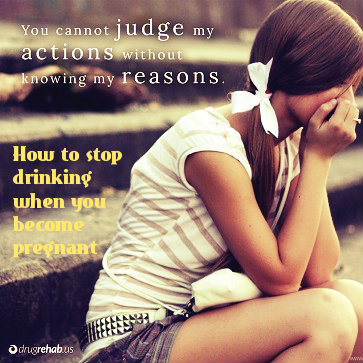 Many women who get pregnant without having planned for it worry that they have already caused harm by drinking during their early stages of pregnancy. While it is best to not be drinking at all, the most important thing is to stop drinking as soon as you find out. Not all experts agree on just how much alcohol can cause harm to a fetus, but the first few weeks are a time of rapid development. That being said, many women do go on to give birth to perfectly healthy babies.
Many women who get pregnant without having planned for it worry that they have already caused harm by drinking during their early stages of pregnancy. While it is best to not be drinking at all, the most important thing is to stop drinking as soon as you find out. Not all experts agree on just how much alcohol can cause harm to a fetus, but the first few weeks are a time of rapid development. That being said, many women do go on to give birth to perfectly healthy babies.
The real issue is what can happen if you continue to drink throughout your pregnancy. Any amount of alcohol can impact your child and cause fetal alcohol spectrum disorders. These are preventable illnesses that produce a variety of symptoms in a child whose mother drank during pregnancy. Possible symptoms include unusual facial features, low body weight and small size, poor coordination, hyperactivity, learning disabilities, delays in developing speech and language skills, sleep difficulties, vision and hearing problems, and even organ damage.
How Do I Stop Drinking?
There is no point in feeling guilty about having already consumed alcohol while pregnant. Now is the time to cut yourself off completely, no matter how difficult that may be. Of course if you feel you can’t do it, no matter the risk to your child, turn to addiction professionals to help you get sober and monitor both your health and that of your baby.
If, on the other hand, your problem is not that severe, there are some steps you can take to make giving up alcohol a little easier. First, associate and socialize more with people who don’t drink or in situations where there will be no alcohol. Going to parties where everyone is drinking will make quitting much more difficult.
Learn how to make fantastic virgin drinks. Cocktails are huge right now and there is no reason you can’t join in on the trend. There are plenty of resources available to help you find recipes for delicious mocktails. Or, get creative and come up with your own recipes.
If drinking has been a habit that helps you relax and unwind at the end of the day, replace it with a healthier way to de-stress. Exercise is a wonderful way to relax, and also for you and your baby to stay healthy. Just be sure that you keep your doctor in the loop in case certain types of exercise should be avoided. You can also relax by engaging in a hobby, reading a good book, taking a nice long bath or by meditating.
Giving up alcohol for the health and safety of your baby may be the most important thing you ever do. It won’t be easy if you have made a habit of drinking too much or regularly, but it is doable. Just remember that if you really struggle to get on the wagon, professionals are available to help you.
Learn More – Why Do Women Continue To Drink During Pregnancy?
If You Need Help With An Addiction, Call Us Now – We Are Available For You 24/7
People diagnosed with some form of mental illness have steeply increased odds of smoking cigarettes. Doctors and researchers have proposed a range of underlying mechanisms to explain this connection between cigarette use and mental health issues. In a study published in April 2014 in the journal European Addiction Research, a team of Dutch researchers investigated how blood levels of a nicotine byproduct called cotinine affect any given person’s risks for having diagnosable problems with depression or an anxiety disorder.
Almost 20 percent of American adults have some form of diagnosable mental health problem. A similar percentage of the total adult population smokes cigarettes. However, current figures indicate that more than a third of U.S. adults with a mental illness diagnosis are smokers.
Additional Groups That Have A Greater Chance Of Smoking
In addition, researchers know that certain segments of the larger population of mentally ill adults have unusually heightened odds of being smokers, including younger individuals, those with relatively little educational achievement, people living in poverty and people with an Alaska Native or American Indian racial/ethnic background.
Explanations for the link between mental illness and smoking that have at least some scientific support include a tendency among people diagnosed with mental health problems to use cigarettes as a form of self-medication, an increased tendency toward mental illness among people who smoke and an increased tendency for smokers to use alcohol or other substances that carry their own separate mental health risks.
Nicotine And Cotinine
 Nicotine is the addictive substance responsible for fostering the patterns of repeated cigarette use common among smokers. Any given cigarette contains roughly 1 to 2 mg of nicotine, the federal Centers for Disease Control and Prevention report. This nicotine travels through the bloodstream to the brain, where it produces its mind-altering and addiction-promoting effects. After producing these effects, the drug does not immediately leave the body.
Nicotine is the addictive substance responsible for fostering the patterns of repeated cigarette use common among smokers. Any given cigarette contains roughly 1 to 2 mg of nicotine, the federal Centers for Disease Control and Prevention report. This nicotine travels through the bloodstream to the brain, where it produces its mind-altering and addiction-promoting effects. After producing these effects, the drug does not immediately leave the body.
Instead, it lingers in the bloodstream for a number of hours before breaking down into its main byproduct, cotinine. Cotinine stays in the body much longer than nicotine, and is therefore easier to trace. For this reason, in laboratory experiments, researchers commonly use the level of cotinine in a person’s bloodstream to track his or her involvement in cigarette use. While this byproduct always stays in the body longer than nicotine, the rate of cotinine processing varies from person to person.
How Smokers’ Cotinine Levels Affect Mental Illness
In the study published in European Addiction Research, researchers from three Dutch institutions explored the role of cotinine levels in determining which cigarette users have increased chances of developing diagnosable symptoms of major depression or another depressive disorder, or symptoms of any one of the conditions known collectively as anxiety disorders (panic disorder, general anxiety disorder, social phobia, etc.).
The data for this exploration came from 1,026 cigarette-using adults enrolled in a project called the Netherlands Study of Depression and Anxiety. All told, 692 of these cigarette users had active symptoms of a depressive disorder or an anxiety disorder. Another 190 study participants had a previously diagnosed case of depression or anxiety currently in remission, while the remaining 144 participants had no history of diagnosable depression or anxiety.
The researchers calculated the number of cigarettes smoked on a daily basis by each study participant, as well as the amount of cotinine found in the bloodstream after cigarette use occurred. After completing these calculations, they concluded that, for any given amount of cigarettes smoked, those individuals with relatively low levels of cotinine in their bloodstreams have the highest chances of experiencing diagnosable symptoms of anxiety or depression. The difference in cotinine levels is especially stark between those individuals currently affected by depression or anxiety and those individuals who have never had symptoms of these mental health problems.
The authors of the study published in European Addiction Research believe that smokers affected by a depressive disorder or an anxiety disorder may process the cotinine left over in their bloodstreams at a substantially faster pace than smokers not affected by depression or anxiety.
In turn, they believe that this faster cotinine processing may help provide an underlying reason for the relatively high daily cigarette intake among anxious and/or depressed smokers, as well as an underlying reason for the relatively poor smoking cessation outcomes for anxious and/or depressed cigarette users who try to quit.
See How The Odds For Quitting Smoking Triple With Counseling And Medication
16 Jul 2014
Is Addiction A Brain Disease?
The nature of addiction has been debated for decades. The prevailing current view is that addiction is not a choice; it’s a chronic illness that affects the brain. Some, however, even addiction experts, reject this categorization and insist that addiction is a rational choice. There are dangers on both sides. Defining addiction as a disease may give addicts a sense of hopelessness and lack of control. Blaming addicts for their choices, on the other hand, results in stigma and shame.
When coping with a loved one who is addicted, it is important to understand what the research really tells us. While there is still room for debate, the evidence is overwhelming that addicts have a chronic brain disease. By better understanding how drugs or alcohol have changed a loved one’s brain, you may be able to find the patience and compassion to help him.
Addiction Defined
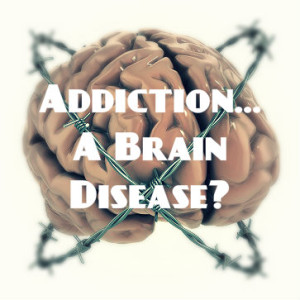 Modern research has uncovered some of the secrets of addiction. Those at the forefront of addiction expertise and treatment follow evidence-based practices and learn from medical research. With that in mind, the American Society of Addiction Medicine defines addiction as “a primary, chronic disease of brain reward, motivation, memory, and related circuitry.” In other words, to the best knowledge of those who study and treat addiction, addiction is a disease of the brain.
Modern research has uncovered some of the secrets of addiction. Those at the forefront of addiction expertise and treatment follow evidence-based practices and learn from medical research. With that in mind, the American Society of Addiction Medicine defines addiction as “a primary, chronic disease of brain reward, motivation, memory, and related circuitry.” In other words, to the best knowledge of those who study and treat addiction, addiction is a disease of the brain.
How Drugs Affect The Brain
If addiction is a disease of the brain, what exactly does that mean? It is easy to comprehend what a disease is. For instance, asthma is a disease that affects the respiratory system. Inflamed airways make it difficult to breathe. The right medications, avoiding triggers, and following a doctor’s orders all help asthma sufferers stay well and breathe with less difficulty.
Addiction is a disease that affects the brain. The initial use of drugs is a choice, but once in the bloodstream, drugs get into the brain and start to cause changes that impact mood and behavior. The first thing that happens when someone takes a drug is that cells in the brain release large quantities of a chemical called dopamine, which gives the user a sense of euphoria. That great feeling encourages subsequent and repeated drug use in order to recapture the euphoria.
Drugs also impact parts of the brain related to memory and self-control. Memories of taking a drug can make the user start to crave it again and again. The way in which drugs affect our control mechanisms in the brain mean that a user’s ability to resist cravings becomes severely impaired. These brain changes caused by drugs and alcohol clearly demonstrate that addiction is far more complex than making choices.
How Is Addiction Chronic?
As you cope with helping a loved one struggling to get into recovery, it is also important to understand the chronic nature of the disease. This means that there is no cure for the disease, only treatments. Like any other chronic illness, addiction is life-long. Relapses are not uncommon, but can be minimized by keeping up with treatments and establishing and maintaining a strong support system. In fact, research shows that rates of relapse among addicts are similar to those among people with other chronic diseases, like asthma.
Watching a loved one’s struggle with addiction is heartbreaking and frustrating. From the outside looking in, it can be difficult to understand why he doesn’t just stop using drugs. The more you understand his disease, that it impacts his brain and is chronic, the better able you will be to help him and to remain positive and patient with him as he gets treatment.
Read Our Other Posts For Friends And Family Of Addicts
15 Jul 2014
5 Ways To Open Up In Recovery
It’s natural to feel resistant about going to rehab for your addiction. Seeking treatment means a whole world of new possibilities, many of which are frightening. You might fail the first time around. You might succeed and get sober only to realize you have no idea how to live without drugs or alcohol. These fears and resistance to going into rehab and therapy can make you want to clam up. Your best chance at successful recovery comes when you give yourself fully to the process, and this means opening up, sharing your weaknesses, and likely feeling vulnerable. Here’s how to get past your fears and misgivings and open up to your therapist and fellow recovering addicts.
5 Ways To Open Up In Addiction Recovery
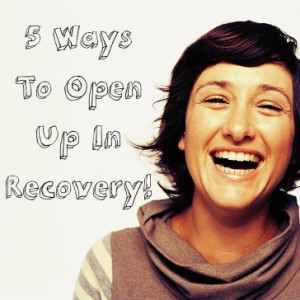 1. Commit To The Program
1. Commit To The Program
Despite all your reservations, fears and uncertainties, give yourself the best chance of success by committing to your treatment program from the beginning. If you go into rehab with a positive attitude and the willingness to do what it takes to get well, you will find it easier to open up to others as a part of your treatment.
2. Listen First
If you are feeling hesitant about opening up in therapy or group sessions, give yourself a little time to get comfortable. This is a completely new experience and you are out of your element. As you settle in, listen to those around you. Listen to your fellow patients opening up in group therapy. Absorb what they have to say and notice how the others react. No one is ridiculed for sharing personal stories and feelings, right? Listening to others will help you to realize that you are in a safe place and will help you feel comfortable about talking when it’s your turn.
3. Start A Journal
Opening up to others is a big step. Start with a baby step if you’re finding it difficult to do. Open up to yourself by writing down what you want to share with your therapist or your peers. As you begin to write down what you feel and what you have experienced, the task of saying these things aloud, and to others, will become easier to do.
4. Let Your Therapist Be Your Guide
You may not be asked to open up in a group session on the first day, but your counselor or therapist will want to hear from you in one-on-one talks right away. This may be easier than talking to a small group, but it’s still tough. Remember that your therapist is there to guide you through your treatment. Let her guide your sessions and what you talk about. The pressure is not all on you to decide what to say. Once you get going you may just find that you can’t stop talking.
5. Know When Not To Open Up
Your rehab facility, and especially your time with your therapist, should feel safe. While it’s natural to feel reluctant to speak up at first, you should be able to relax into the process of talking about yourself. If you just can’t do it, or your gut is telling you that something isn’t right, you might not be the problem. Not all programs or therapists are created equal. If you feel uncomfortable where you are, get out and find a program or a therapist that does feel right.
Opening up is never easy. When you have so much bottled-up shame and guilt because of your addiction, getting your feelings out in the open is both a challenge and a catharsis. Take steps toward opening up and you will reap the rewards of a true breakthrough.
See Our Other Posts With Helpful Recovery Tips – Recovery Is Possible!
14 Jul 2014
How To Cope With Binge Eating Disorder As A Man
Eating disorders are typically thought of as women’s issues, but the truth is that men deal with these serious problems too. The struggle is sometimes worse for men because of the extra stigma attached to being a man who has food issues. Among the recognized eating disorders, binge eating is one that many men battle. Sometimes also referred to as food addiction, this disorder involves compulsive eating and usually also causes weight gain. If you are a man who binges on food, you are not alone and there is help for you.
What Is Binge Eating Disorder?
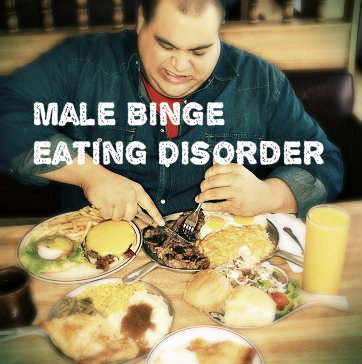 Binge eating disorder, or BED, is called food addiction too because it is a lot like an addiction. It is characterized by out-of-control eating binges, obsessive thoughts about eating, and feelings of guilt and shame associated with binges. Like drug or alcohol addicts you probably turn to food to cope with emotions. Maybe you eat because of stress. It could also be anxiety or depression that triggers your eating binges.
Binge eating disorder, or BED, is called food addiction too because it is a lot like an addiction. It is characterized by out-of-control eating binges, obsessive thoughts about eating, and feelings of guilt and shame associated with binges. Like drug or alcohol addicts you probably turn to food to cope with emotions. Maybe you eat because of stress. It could also be anxiety or depression that triggers your eating binges.
BED is more common than other eating disorders like anorexia and bulimia. One in 35 Americans struggles with binge eating. This statistic amounts to around five million women and three million men. While anorexia and bulimia are much more common in women than in men, BED is not rare in the male population.
Being A Man With An Eating Disorder
Having an eating disorder means coping with a difficult mental illness. In the case of BED, it also means dealing with addictive-like behaviors. Add to this being a man, and your battle becomes even greater. Women are more likely to get help for an eating disorder, while men are more likely to be in denial because of the added stigma. The statistics should assure you that you are not alone and that you are far from the only man dealing with binge eating. Here are some ways to help you cope and heal from your food addiction:
- Get Professional Help – If you can’t control yourself around food, you will never get better without the help of an experienced professional. It isn’t easy to ask for this help and you may feel embarrassed or ashamed to admit to your problem. It may help you to work with a male therapist, but make sure he has experience working with binge eaters.
- Find Support – One of the most important ways to successfully heal from an addictive disorder is to rely on the support of others. Overeating and binge eating support groups that are similar to AA are available. You should be able to find one that caters to men to make you feel more comfortable. If you can’t find a group in your area, look for online support groups for men with eating disorders.
- Stop Eating Alone – Binges typically occur when you are alone. Because of shame and embarrassment you are more likely to control yourself around other people. In addition to the support and professional help you get, force yourself to always eat with other people around. This will help you to control your urges.
- Replace Binges With Healthy Activities – Without eating binges to indulge in, you may be left with a void. Fill that hole with new and healthy activities. Exercise is a great choice because it will help you lose weight and give you more confidence. Any kind of hobby or new interest is a good way to replace your food binges.
Binge eating disorder is not easy to cope with for anyone. But as a man you face the added stigma of being a male with an eating problem. It’s time to face your fears and get the professional help you need. With the right therapist, support from other men and your own strength, you can conquer binge eating.
If You Or A Loved One Is Struggling With An Eating Disorder – Call Our Counselors Now – We Will Get You The Help You Need!
The device called an e-cigarette is a big story in the news these days. They appeared on the market several years ago as a way to help smokers quit and now they are reaping in billions of dollars in sales every year. Controversies surround these devices; not least of which is the harm they may pose to children and teens. So what is an e-cigarette and what do you need to know about them to protect your children? Get the facts and talk to your kids about e-cigarettes before they experiment on their own.
What Are E-Cigarettes?
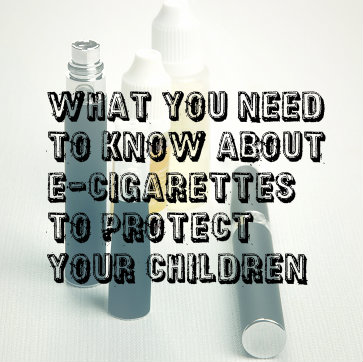 An e-cigarette is a device that uses a battery to warm a small vial of nicotine dissolved in liquid. The user inhales the vapor to get the nicotine and exhales water vapor. The idea is that a smoker can use an e-cigarette to get a nicotine fix without inhaling the thousands of harmful compounds that are in cigarette smoke and which cause health problems. Studies as to whether they really help people quit are ongoing. There is no definitive answer yet, but what seems to be clear is that e-cigarettes are useful for some smokers and not for others.
An e-cigarette is a device that uses a battery to warm a small vial of nicotine dissolved in liquid. The user inhales the vapor to get the nicotine and exhales water vapor. The idea is that a smoker can use an e-cigarette to get a nicotine fix without inhaling the thousands of harmful compounds that are in cigarette smoke and which cause health problems. Studies as to whether they really help people quit are ongoing. There is no definitive answer yet, but what seems to be clear is that e-cigarettes are useful for some smokers and not for others.
Are E-Cigarettes Harmful To Kids?
Although they don’t produce smoke, e-cigarettes are still devices that deliver a hit of a one of the most addictive substances, nicotine. Because e-cigarettes are marketed as a healthier alternative to smoking, most young people inaccurately assume there are no risks in using one. Nicotine is highly addictive and any child or teen using an e-cigarette is at significant risk of becoming addicted to it. There is also the risk of poisoning. Nicotine is poisonous in high doses and the liquid in the e-cigarette can be toxic.
Nicotine is a drug that affects the nervous system, the brain, and the heart. Someone abusing nicotine will experience an elevation in blood pressure and heart rate. High doses can cause a dangerous heart arrhythmia. In rare cases, and with large doses, this arrhythmia can be fatal. With their smaller bodies, kids are more vulnerable to these risks than adults are.
How Do I Protect My Kids from E-Cigarettes?
When it comes to any kind of drug, knowledge is power. Once you understand the risks and dangers associated with e-cigarettes, you can share them with your kids. You should have regular conversations with your kids about substance abuse, alcohol, peer pressure, smoking and other issues they face as children and as teens. Bring e-cigarettes into the conversation and make sure they understand that these devices are not safe.
Also make sure your kids understand how e-cigarette makers are specifically trying to target them to get them hooked on nicotine. The manufacturers make these devices with an array of flavors that mimic fruit, candy, cookies, and specific products that children love, even Girl Scout cookies. The companies making e-cigarettes have no qualms about targeting kids and teens in this way and they even sponsor events, like rock concerts, that attract young people.
Despite the risks, teens and even children are trying e-cigarettes. According to surveys, one in ten high school students has already tried e-cigarettes. As a parent, it is your job to stay on top of the changing landscape of harms and risks posed to your children and to protect them. By learning about e-cigarettes you can help your kids understand all the reasons they should avoid these devices. The risks of nicotine use are too great and we still don’t understand the full danger of e-cigarettes. Keep yourself and your children knowledgeable and you’ll empower them to make better choices.
Learn More About How E-Cigarettes Are Secretly Being Used To Hide Drug Use
10 Jul 2014
What, You’re An Atheist? You’ll Never Get Sober!
Atheists in AA may get the impression that they’re going to have it tough. All the talk of a higher power might be abhorrent to you, and like The Fix writer Bill Manville, you might be told that “Booze is too tough to beat all alone without the help of Jesus and His Infinite Mercy.” But is this really true? If you’re an atheist, is AA just a waste of time because it requires you to accept something you can’t fathom? Bill wondered this himself, but he attended anyway and—aside from one short relapse—has been sober for 20 years. So how did he do it? Esprit de corps, or in English: group cohesion.
Lyrics Without The Music: Drawing Parallels With Addiction Recovery
 Manville asks if you’ve ever read the lyrics to a popular song without the music pumping along to back it up. If you have, you’ll have undoubtedly noticed that without the thumping beat, the power of the words is diminished. It’s only when those lines are spoken with the incorporeal addition of the feel and strength of the music itself that they take on an almost mystical sense of meaning and importance.
Manville asks if you’ve ever read the lyrics to a popular song without the music pumping along to back it up. If you have, you’ll have undoubtedly noticed that without the thumping beat, the power of the words is diminished. It’s only when those lines are spoken with the incorporeal addition of the feel and strength of the music itself that they take on an almost mystical sense of meaning and importance.
He draws the analogy between this and addiction treatment. When you attend lectures on addiction, learn about the consequences, causes and anything you can about your problem, it’s like reading the lyrics without the music. You understand the meaning in a flat, emotionless sense (and the message that you should stop abusing drugs) but you don’t have thumping, powerful drive underpinning it all that motivates you to action. It’s missing the music.
The Therapeutic Community And AA
The rehab Manville eventually attended called itself a “therapeutic community,” with a counselor commenting that, “it’s the existential experience of going through the process with a bunch of other addicts and drunks—all of whom want to stop too—that changes the self.” Despite his initial skepticism, he found himself beginning to understand the importance of this community aspect.
He likens it to the Army, where the tough experience of basic training builds a group morale that gives the otherwise uninspired the motivation to rush into enemy territory to complete the mission at hand. The fact that you’re part of a larger group that shares your mission and has experienced the same sort of problems you have gives you that same type of motivation. You aren’t just one person being asked to tackle addiction alone. You’re part of a larger, stronger group and that in itself gives you the motivation to fight.
Getting Sober Without God
In AA, the “higher power” doesn’t have to be a deity, to the relief of any addicted atheist. Manville found his higher power in a different place: the esprit de corps and the desire to socially fit in with the new group did it for him. That was where the music came from. His theory is explained perfectly in his attitude to the Lord’s Prayer as an atheist. He writes, “When I join hands with fellow members at the end, I feel so buoyed by this merging of self into the greater whole that I find myself reciting the Lord’s Prayer aloud just like rest, and if there is indeed a God listening above, I hope my over 20 years sobriety will make Her smile.”
Becoming Empowered Without Religion
The feeling of being part of a larger group gave Manville his power to overcome addiction, but the important lesson for atheists in AA isn’t that you need to embrace the group or you won’t get sober. Embracing and connecting with the group is important for many other reasons, but the thing that spurs you on personally (the “music” for you, if you will) can be anything that works for you.
The true lesson from Manville’s story is that atheists in AA need to understand that you don’t need God to get sober, just something—anything—that takes the intellectual lessons you’ve learned and provides the underlying vigor you need to turn them into reality. Becoming part of the group is just one potential solution. You need to find the one that works for you.
Learn More About Alternative Addiction Therapies
09 Jul 2014
4 Tips To Cope When A Loved One Goes To Rehab
If you have a loved one struggling with addiction, getting her into rehab has probably been your top priority. Now that she’s gone, how do you cope? An important person is missing from your life. You have cared for her, been there for her, tried to help her overcome her addiction, and now you have turned your responsibilities over to someone else. You may be experiencing feelings of loss or guilt. Now is the time to learn how to take care of you, how to feel comfortable letting go, and how to get ready to have a sober loved one return home.
1. Learn About Addiction And Treatment
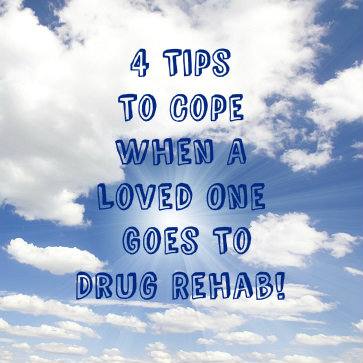 Information is power and knowing more about what your loved one is going through will help you to better understand her. It will also help you to feel connected to her while you cannot be together. Read up on addiction, what it is, what it means for the addict, and how it impacts everyone around the addict. Learning about this disease will give you important insights into your situation.
Information is power and knowing more about what your loved one is going through will help you to better understand her. It will also help you to feel connected to her while you cannot be together. Read up on addiction, what it is, what it means for the addict, and how it impacts everyone around the addict. Learning about this disease will give you important insights into your situation.
You should also learn more about addiction treatment so that you know what is happening with your loved one at rehab. You may not be able to hold her hand through the process, but you will feel more comfortable when you understand what it entails. It may also be possible for you to get involved in her treatment at some level. Most rehab facilities offer family counseling as a component of treatment. Be sure to volunteer for these sessions to give you a chance to see your loved one and to participate in her care.
2. Join A Support Group
Being on the outside can be tough. You want to be there with her, helping her along the way. Surrendering that control to others is not always easy. One important way to cope with your feelings is to share with and learn from others. There are numerous support groups available to help the loved ones of addicts. They can be general groups that include all loved ones of addicts, or more specific. The great benefit in joining a support group is to share the burden of your grief, your guilt and all the other negative emotions attached to your loved one’s addiction and treatment.
3. Find Your Passion
As you learn to cope with having temporarily lost your loved one to rehab and treatment, it is important that you tend to yourself. For a long time you have cared for the addict in your life. You have looked out for her needs and spent so much of your time and energy worrying about her. Now that she is in the capable hands of treatment specialists, you can take care of you.
One of the best ways to do that is to focus on what you love to do. Return to an old hobby that you once felt passionate about or try something new that you have always wanted to do. The road ahead will be difficult and having something that’s entirely yours that you feel passionate about will help you cope both now and in the future.
4. Accept And Trust That Everything Will Be Ok – No Matter What
Having a loved one in rehab can be stressful for you. Just remember that you have left her in good hands with professionals who have experience treating addicts and who care about the patients they treat. Also remind yourself of how necessary this step was. She would never have been able to heal without professional treatment. Take care of yourself, participate in her sessions where possible and be ready to welcome back your sober loved one.
Read Our Other Posts For Friends And Family Of Addicts – Recovery Is Possible – Call Us Now To Begin The Path To Healing And Freedom From Addiction!


